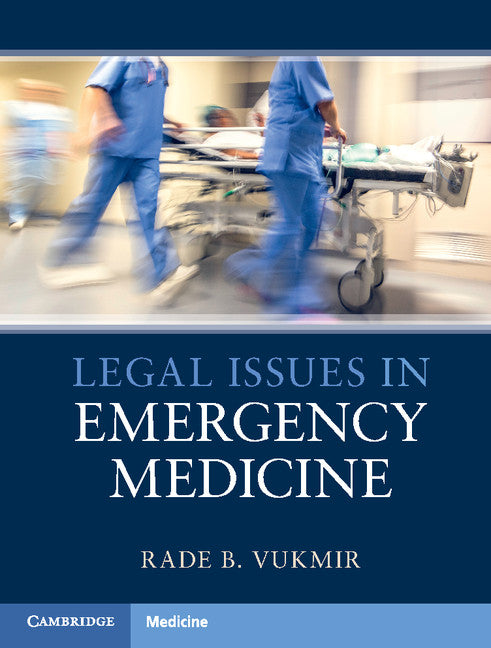Freshly Printed - allow 4 days lead
Couldn't load pickup availability
Legal Issues in Emergency Medicine
This book provides a clear pathway through the common yet complex legal dilemmas frequently encountered in emergency medical practice.
Rade B. Vukmir (Author)
9781107499379, Cambridge University Press
Hardback, published 22 March 2018
368 pages
25.4 x 19.5 x 2.5 cm, 0.87 kg
On any given day in the emergency department, the chance of confronting a medical-legal dilemma is significant. Emergency medicine and critical care practitioners may have to deal with malpractice claims, informed consent, protection of minors, resuscitation, operational issues and legal compliance requirements frequently. Substantial knowledge of the law as it pertains to their emergency care and acute care practice is essential. Legal Issues in Emergency Medicine is an invaluable resource for medical practitioners, legal practitioners and administrators in practice and in training. The book covers key topics that have direct relevance to day to day acute patient care practice. Each topic includes a clinical vignette, followed by a review of the legal controversy, current medical scientific evidence, case law and preventative solutions to the dilemma. This approach allows practitioner exposure to a wide variety of medical-legal problems, allowing a pre-emptive, informed approach to problem solving.
1. Abandonment in the emergency department
2. Abandonment of patient by treating physician
3. Admission
4. Advance directives
5. Advanced practice providers
6. Adverse event disclosure
7. Against medical advice (AMA)
8. Americans with Disabilities Act (ADA) and education
9. Americans with Disabilities Act (ADA) and access to facilities
10. Assault
11. Assisted suicide
12. Battery
13. Bed boarding
14. Brain death
15. Care of children
16. Code response
17. Commitment
18. Communication
19. Competence and capacity
20. Confidentiality
21. Consultation
22. Controlled substances
23. Criminal charges
24. Criminal acts
25. Death certification
26. Decision-making
27. Difficult patient encounter
28. Discharge instructions
29. Disruptive provider behavior
30. Do Not Resuscitate (DNR)
31. Documentation
32. Domestic violence
33. Driving impairment
34. Drug and alcohol abuse
35. Duty to warn
36. Electronic health records (EHR)
37. Emergency consent
38. Emergency Medical Services (EMS)
39. Emergency Medical Treatment and Labor Act (EMTALA)
40. Employment issues
41. Expert witness
42. Fitness for duty
43. Frequent user
44. Futility
45. Geriatric abuse
46. Good Samaritan
47. Guidelines and protocols
48. Health Insurance Portability and Accountability Act (HIPAA) / Health Information Technology for Economic and Clinical Health Act (HITECH)
49. HIV
50. Hospital medicine
51. Immigrant care
52. Impaired physician
53. Indigent care
54. Inflight emergencies
55. Informal consultation
56. Informed consent
57. Insurance
58. Intoxication
59. Laboratory testing
60. Left without being seen (LWBS) / left without treatment (LWOT) / elopment
61. Malpractice claims
62. Mandatory care
63. Mandatory reporting
64. Medical education
65. Medical errors
66. Medical records
67. Medical Screening Exam (MSE)
68. Minor consent
69. Missed illness and injury
70. Multiple visits
71. Nursing
72. Operations
73. Organ donation
74. Overcrowding
75. Pain control/medication
76. Patient satisfaction
77. Pediatric abuse
78. Peer review
79. Policy/procedure
80. Pregnancy
81. Prescription writing
82. Privacy
83. Professional boundary issues
84. Protected health information (PHI)
85. Psychiatric care
86. Referral
87. Religion
88. Research
89. Restraint
90. Resuscitation
91. Service contract
92. Sexual assault
93. Social media
94. Staff privileges
95. Subpoena
96. Substance abuse
97. Suicide
98. Telemedicine
99. Telephone advice
100. Third-party duty
101. Transfer
102. Translation, interpreting, and language issues
103. Triage
104. Unanticipated death
105. Urgent care
106. Violence
Glossary.
Subject Areas: Accident & emergency medicine [MMK], Medicolegal issues [MBQ], Medical ethics & professional conduct [MBDC]


